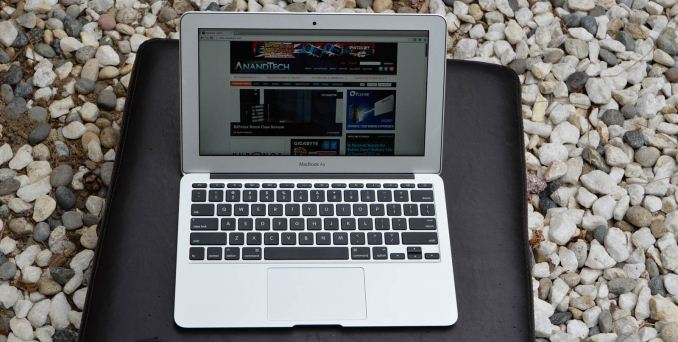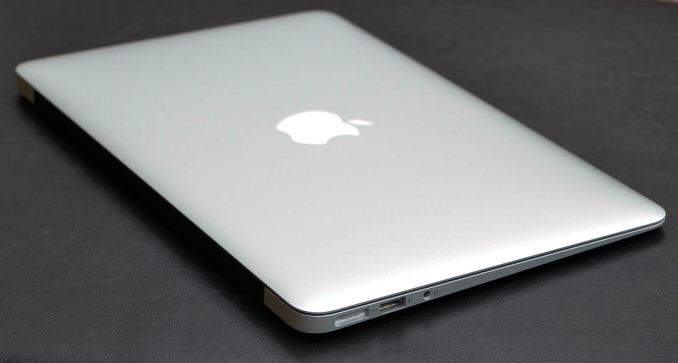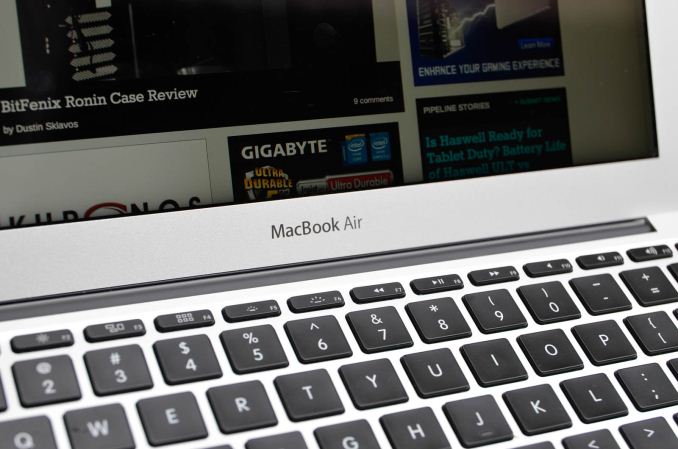The 2013 MacBook Air Review (11-inch)
by Vivek Gowri on August 9, 2013 1:45 AM ESTI come away from the 11” Air with mixed feelings. The modern silicon and generally better specced 2013 model has turned the 11” Air into a far more well rounded notebook than it has been in the past, at least in base $999 form. Unfortunately, the rest of the picture isn’t as rosy. The chassis and especially the display are starting to show their age, even more so than in the 13” Air, and anyone looking for any kind of performance gain over the previous generation is out of luck. The battery life is awesome, it really changes the way you approach the system, and I still love this form factor, but it’s hard to look at this and not compare it to an Ultrabook with a far better display for the same price.
I know Anand has long said that Macs and PCs don’t get cross shopped that often, but recently I’ve been asked for notebook advice by a lot of people who are completely platform agnostic. With the emphasis on web apps, there’s not much holding a normal consumer to one platform or the other unless they have a specific reason (gaming, media creation, familiarity) to ignore one of them. So when you look at something like Sony’s VAIO Pro 11, with a 1080p IPS 11.6” capacitive multitouch display, roughly similar specs (1.6GHz i5-4200U, 4GB, 128GB PCIe SSD), a half-pound lighter body (1.92lbs) with similar dimensions, and roughly the same price point—$1049 street price at the time of writing—it makes you think.
Sure, you lose some of the niceties you get with the new Air—802.11ac, Thunderbolt, the best touchpad in the world (you can’t find another laptop in the world with that combination of things at any price, at least until the next generation of MacBook Pros come out this fall)—and Windows 8 notebooks have never been able to match the battery life of Apple’s notebook line. Sony claims 7 hours of runtime on the 34Wh battery, though it’s worth noting there’s an optional slice battery that adds an extra 35.2Wh of capacity at the cost of a 0.6 lb weight gain. The real question though, how much of the added features would be worth sacrificing for that display upgrade?
On a more global scale, I feel like this is the end of the line for the current MacBook Air chassis. It’s been around for a handful of years now, and I honestly can’t see Apple keeping it around for another go-around. Particularly given how much smaller the Haswell ULT package is and how much less populated the 2013 Air PCB is relative to its predecessors, a sleeker redesign for Broadwell seems inevitable. I’d love to see them get this closer to or even under under the two pound mark without sacrificing the aluminum chassis, because that would really push the boundaries of mobility. I’d like smaller bezels around the LCD as well, though that is more dictated by the size of the keyboard and trackpad than anything else.
Also, it’s clear that something has to give with regards to the displays. I’m not sure when it’ll happen, but it’d be very odd for Apple to continue iterating a thoroughly modern, bleeding edge computer without changing the five year old display panel at some point. Considering all that Apple has done over the years to push notebook displays, it’d be very out of character for them to not address this issue within the next couple of years, particularly as the internal silicon gets so much more power efficient.
Given where this generation of Apple portables has gone, I think the upcoming MacBook Pros will be very interesting. Apple has really prioritized battery life, and the whispers of no dedicated graphics in either MBP makes things very interesting (if a bit concerning from a performance standpoint). If the 54Wh battery in the Air 13” gets to 11 hours of battery runtime without too much trouble, just imagine what the 74Wh battery in the rMBP13 or the 95Wh battery in the rMBP15 can do with Haswell’s power efficiency, particularly if the updated MBP13 gets a single chip 28W Haswell ULT part with Iris graphics. I get chills just thinking about it.
But in terms of the 11” Air, the main point of comparison that needs to be addressed is the 13” Air. I know I covered this in the intro, but it’s worth revisiting. The 13” is without question the better computer, and if you’re looking to replace a laptop, it’s definitely the way to go. I like the 11” Air as a tablet replacement—I’d rather carry this than my iPad on almost every day of the week (unless I need the built-in LTE). It’s almost impossible to use as a primary system though, the way you can with the larger Air. The difference-maker relative to the 13” Air isn’t the weight, since that’s still quite light at 2.96lbs, but the footprint. While the 11” Air is small enough to fit basically anywhere an iPad can be carried, the 13” is much closer to the size of a real notebook. The fact that I’d be making minimal compromises to carry a real notebook versus the iPad is startling, and if you need the most mobile productivity machine you can get, it’s hard to top this. As we start to see more Haswell-based ultraportables and tablets, particularly when the Haswell ULX (Y-series) parts hit, this might change, but for now I feel pretty comfortable saying that.













139 Comments
View All Comments
Torrijos - Friday, August 9, 2013 - link
One has to wonder how much more battery life improvements OS X Mavericks will bring, seeing how Apple made most of their selling points about energy efficiency.xTRICKYxx - Friday, August 9, 2013 - link
I've been using Mavericks for a while and I haven't noticed anything too drastic. I typically get around 7-8 hours of light workload for my 15". At most maybe a 10% increase.But this is not including the fact that most of my 3rd party apps do not include App Nap yet. It could make a difference.
ctrocks - Friday, August 9, 2013 - link
I still want to know the fascination with 11 inch notebooks. I am 6'3" (1.9m) tall, with relatively large hands, and am 47 with good vision for my age (no glasses needed yet). 13 inch notebooks seem small to me, let alone 11. My hands can't fit comfortably on keyboard to touch type.I understand portability, but I just can't see using such a small device except for cases where extreme portability is an absolute necessity. I would prefer a 15 inch screen, and a bigger keyboard that fits me over portability.
abazigal - Friday, August 9, 2013 - link
You just answered your own question. Ultra-portability. 15-inch laptops are great to use, but absolute murder to haul around when it's time to pack up and leave.ananduser - Friday, August 9, 2013 - link
Since you talked about the new Sony Vaio, how about, you know, actually reviewing one(the Pros or the Duo or both). You(Anandtech not Vivek) have reviewed 3 MBAs already and not a single other ultraportable.BTW corners have been cut in order to achieve the MBA's battery life, the low res screen and the relatively slower CPU. Why not mention it so as to compare apples to apples(no pun intended)?
fokka - Friday, August 9, 2013 - link
though i'm not a big fan of the mba, i still think that it is a valid choice for someone seeking portability and not dependent on a ton of processing performance, even more now the battery life has improved to a level you don't really have to think about it much anymore on a day to day basis.sure, the display is a bit of a bummer, but only because we became so spoiled by tablets and high-DPI laptops in the recent years. still, it won't hinder you doing any of your work.
what i like about the air and essentially the entire macbook line-up, is that they are no-nonsense solutions. you get a great package of high quality case, great input devices, above average display quality and most important usable battery life on a mobile device.
just compare it with the vaio pro. i love some of the vaio lineup for their performance, features and portability, but no way in hell i'm going to shell out this much for a plasticy-feeling computer, no matter if they call the material carbon fiber, magnesium, or whatever they come up with.
still, using a 2010 mbp13 right now, i'm not really thinking of investing in apple gear again very soon since i learned to prefer a more native windows environment. this is where asus zenbook line comes into play and i hope they can make similar progress with the haswell upgrade as apple, all while providing a great 1080p display.
ESC2000 - Saturday, August 10, 2013 - link
So a plastic feel would stop you from an otherwise superior product? Thus is the same tired old argument always trotted out by Apple fans. They used it when the S4 came out with features that demolished the iphone 5. They've probably used it for every Samsung phone that has been released with that prole plastic.It is your business how you spend your money, but I but devices to perform tasks for me. If a physical feature is relevant to function (eg the air's unnecessarily large bezels take up precious screen real estate) then I care. But if the best device for me comes in plastic I don't care unless plastic will disrupt its functioning. I don't care whether other people think my device looks expensive. I don't care whether it feels 'plasticky' when I touch it. What is so terrible about plastic anyway?
I know this is a tired old argument. I should probably save this post in keep so I can just copy paste it every time someone tries to say metal is more premium. Apple did do a good marketing job on that one though.
fokka - Saturday, August 10, 2013 - link
i wouldn't even go so far as to call myself an apple fan, since the macbook is the only apple product i ever owned and i'm not having plans on upping that count in the future, but still, i can appreciate certain aspects, like the build quality, of their line up.see, in the end it's just personal preference. i for one wouldn't be happy with a "superior" machine hardware wise, if it feel plasticy and flimsy. and please don't tell me a VAIO lid doesn't feel flimsy. i can't comment specifically on the VAIO pro, but about every sony ultraportable i ever touched had a crazy thin display lid which twisted by mere looking at it, so i feel safe extrapolating from that.
if you are happy with a polycarbonate build that's great and i don't even mean this sarcastically, but for me, i want a device i use for hours to feel great and sturdy and i find this is more the case with a good metal build.
geok1ng - Friday, August 9, 2013 - link
U$1000 for a 768p TN panel. I do agree with the review: lets wait for the Surface Pro with Haswelll parts. Or get a real high end ultraportable with a real high end display, for the same price apple is asking for this airthingieabazigal - Friday, August 9, 2013 - link
Higher screen res typically comes at the expense of poorer battery life. Apple simply made a judgement call to prioritize battery life over everything else. I don't see that as an inherently bad thing.